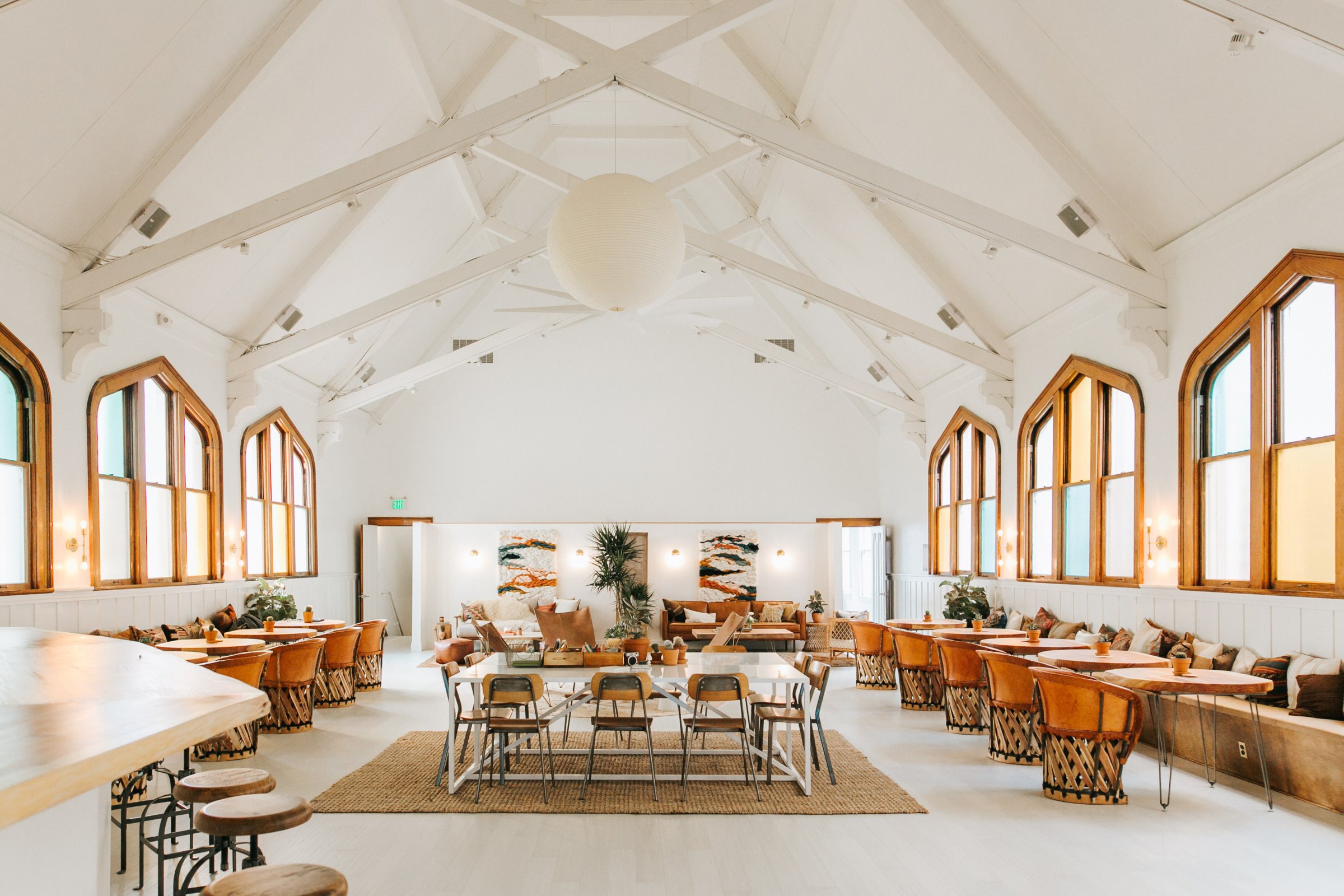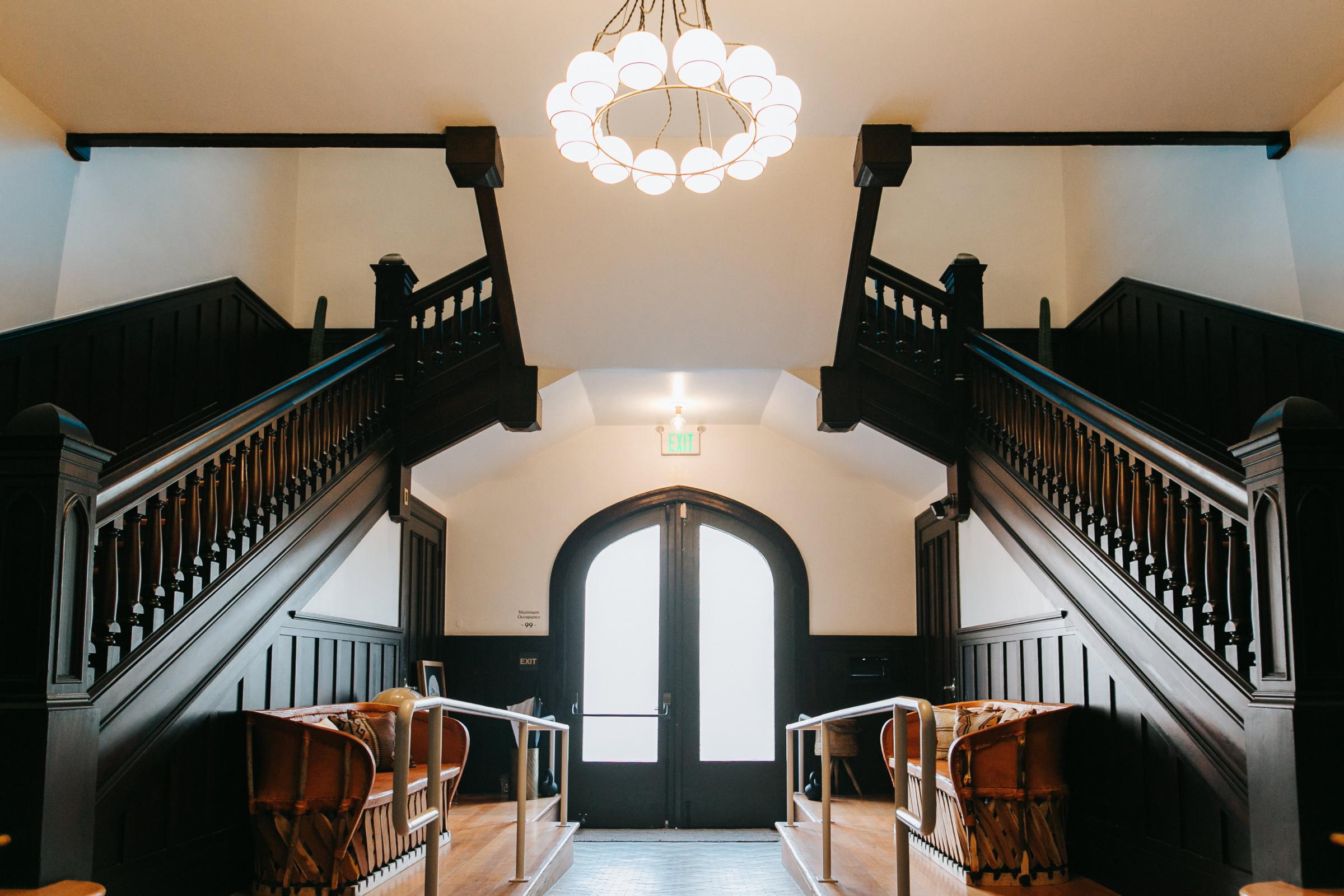
On a rainy morning in the Mission neighborhood of San Francisco, women are filing through the arched doors of a old Greek church carrying bike helmets and laptops. Instead of a tithe, the price for their admission to this sanctuary is $250 per month. There won’t be sermons inside, but there is $3 kombucha and restorative yoga and a pumping room proudly decorated with drawings of breasts. There are also tenets that bind members typing away in the chic “female-forward” space upstairs. It’s not a “traditional” coworking space, says Molly Goodson, founder of a new women-only club called The Assembly. “Really it’s all built around women and self-care.”
The Assembly is one of many spaces popping up across the country that cater to particular types of workers, whether it’s women or LGBTQ individuals or so-called ganjapreneurs. As the coworking industry has matured, “niche” locations that don’t intend to be for everyone have flourished. And, in an era when relying on digital connections can make us feel isolated, workers who might not even join a traditional coworking hub are flocking to them, not only for practical reasons, but also to feel less alone.
“It’s incredibly empowering to be in a space where you know everybody here is hustling through their own thing, as women,” says Myisha Battle, a sex coach who is among the Assembly’s roughly 200 members. “Women are often isolated on teams and you’re made to feel like you’re vying for similar positions,” Battle adds, “whereas this feels like leveling the playing field a little bit.” It’s a sentiment with currency among the couple hundred more women who are waiting to get in.
In the last decade, coworking has morphed from a trend into an international industry, with venture capitalists pouring billions into the sector and dominant players like WeWork hoovering up real estate around the world. By 2022, five million people will be working out of more than 30,000 coworking spaces – one million of them in the U.S. – according to estimates from Emergent Research. While these places must offer the bare necessities (Internet, desk, outlet), what really defines them is that they blend work and social life in ways that can’t happen when workers and companies are walled off from one another. That social aspect might take the form of meetups, guest lectures or trainings. Coworking spaces might offer cooking classes or childcare. And the more tailored the membership, the more specific that programming can be.
Founders are heralding the new crop of specialized spaces as a means of fighting the a loneliness epidemic in the U.S. But some membership restrictions are also raising legal questions, suggesting that the end result could also be making our siloed existences even worse. The New York Human Rights Commission recently launched an inquiry into a women-only club called The Wing after media reports highlighted the fact that men were excluded, a practice that could be in violation of a local sex discrimination law. Even if it’s understandable that women would want rooms of their own, these clubs are “bumping up against laws” meant to protect them, says ACLU Senior Staff Attorney Galen Sherwin. Though the coworking context is new, she says, “historically there have been challenges to these types of spaces.”

There is a simple, powerful reason the coworking movement has such momentum: money. Steve King, a partner at Emergent Research, describes the consumer appeal in waves. The first was demand from freelancers who didn’t want to do all their business from home or a coffee shop filled with distractions. The second was startups who would rather rent space by the desk than commit to an expensive lease. The third, he says, is large enterprises like GE and Microsoft becoming tenants in coworking towers, sending their employees to hubs that are more flexible than a dedicated office and, often, more fun for individual workers. (Such clients are also stable renters for the coworking businesses, relative to startups that might quickly grow out of coworking or cease to exist entirely.)
The mass appeal has created an incentive for new coworking spaces to get specific, even within the startup world. Nick Jiang, co-founder of a new San Francisco-based coworking company called Birdnest, argues that the sense of camaraderie at the more established chains has become fractured and “cookie cutter.” For early-stage companies, the appeal has been not just free beer or ping-pong tables, but a sense of shared struggle, he says. Jiang believes being surrounded by established companies makes that struggle feel more acute instead of less. In a sign of just how ubiquitous the trend is getting, Birdnest’s model is convincing restaurants that are only open for dinner to rent out their tables to coworkers during the day. Jiang hopes their price point — $74 versus a typical $350 per month or more — will appeal to very early-stage entrepreneurs for whom “every single cent counts.”
Economic hardship can be bonding, as can the perils of working in a certain industry or coming from a certain demographic. When asked why he is planning to open a coworking space called Serif for LGBTQ professionals in New York City (following a scrapped plan to open up one called Yass in San Francisco), Brian Tran recalls the pains of growing up as a young gay man in Texas. “What media and society showed me were bars and clubs,” he says of places where queer people congregate. He believes a coworking space will allow people to build more “substantial connections” and plans to host events like legal workshops where lawyers help transgender people change their identification documents. “It’s really just creating a space where people can give back to their younger selves,” Tran says.
Tran also describes apps as one of the insufficient means for LGBTQ people to connect. While the Internet has been a game-changer for LGBTQ people seeking answers and empathy, interfaces still aren’t a replacement for physical proximity. King, the research firm partner, has argued that the coworking boom is as much about humans’ social nature as it is about flexibility or cost-savings. The efforts to gather and be productive take countless forms these days: workspaces at rock climbing gyms, shared biolabs, people offering up their living rooms.
Nick Devane runs a company called Pilotworks, which rents out shared commercial kitchens in multiple U.S. cities where aspirational bakers and food-delivery startups can commune. There’s an financial need: setting up your own commercial kitchen as a budding entrepreneur is expensive and risky. But while people may come for the infrastructure, Devane says they stay for the solidarity. “People are striving and growing and contracting, and the support those companies provide to one another is tremendous,” he says. “It’s what keeps our members from failing.” He cites the example of two bakers, who should be competitors, opting to share flour. “There’s a natural clustering effect,” Devane says, “just a desire to transfer ideas.”
Some have even posited that coworking spots are like America’s new churches, giving young people a regular spot to gather as places of worship have in the past. After all, religion is often about shared struggle too, and efforts that coworking spaces are making to help members with pursuits like “self-actualization” are in line with the millennial ethos. “These days being a good human means being productive and contributing,” Devane says, “and living your life’s work.” A job is supposed to be meaningful, whatever it might pay.
Angie Thurston, a ministry innovation fellow at Harvard Divinity School, has researched the modern manifestations of our tribal needs, in a time when people are “less and less affiliated.” She was recently invited to a coworking conference to speak about these very parallels. “There’s such an acute need for community, for a sense of purpose,” she says. “A coworking space becomes something much more than a place to sit and work and not be alone.”
Take The Coven, a new coworking space in Minneapolis that limits membership to women and non-binary individuals (those who may not identify as a man or a woman). After raising about $315,000 through crowdfunding, they had 230 members join in the first four weeks. For $200 a month, The Coven provides the basics, plus things ranging from a prayer room for Muslim members to bathrooms with “an overflow of free pads and tampons,” says cofounder Bethany Iverson. Key among the offerings are events, which revolve around monthly themes like empowerment and body positivity. “There’s not one thing that we’re hammering home,” says cofounder Erinn Farrell, other than “being your whole self.” It may not be religion, but it is a shared vision of how one should live.
Iverson and Farrell come from advertising and say they got frustrated while working to make the local industry more inclusive. “What if instead of trying to create change within our agencies,” Iverson recalls them thinking, “we just went and built a totally new world?” The team makes no apologies about their decision to exclude men from this utopia. Nearly every other space “is a male-first space,” Iverson says. They know that some “men’s rights” advocates are up in arms about the proliferation of women-focused efforts, be it a club or a movie screening, but they say such a response only goes to show their “fear of scarcity and losing power.”

While most coworking niches cause little ruckus, some are questioning whether these women-only spaces are being fair. With revelations about workplace harassment still ringing in America’s ears, it makes sense that some women view these spaces as working to remedy discrimination. The hard part is that, while private clubs are legally able to reject applicants who don’t fit certain criteria, exclusion gets dicey when organizations appear public-facing. “Everyone is grappling with the questions raised by the fact that there’s this need these spaces are filling,” says the ACLU’s Sherwin, who works on the organization’s women’s rights project.
The founders of The Coven say they have been legally advised that they fit the definition of a private club. But that doesn’t mean every women-only club will pass the same test. In past cases, courts have found that clubs that thought or said they were private – as The Wing has – were in fact public, thus subjecting them to the same laws that forbid businesses from discriminating based on characteristics like race, sex or religion. That distinction can turn on factors like the number of members, whether the business is trying to make a profit, and whether non-members have access to the site.
Defenders of The Wing have rallied behind the notion that women deserve to isolate themselves if they want to, given the treatment they endure. Others have argued that excluding people based on their sex is a bad practice, however justified it might feel. The ACLU has suggested The Wing “may not be in compliance” with New York’s local discrimination law, which also bans many private clubs from discriminating based on gender. But Sherwin notes that these new quasi-offices also raise “untested legal questions.” It’s possible that the debate will eventually have to play out in court.
In the meantime, women at places like The Assembly will be reveling in their haven, decorated with cacti and stained-glass windows, like some desert oasis in the middle of the city. There is a sense among some members that the very existence of the place is evening a score. “I’m a feminist, so what appealed most to me was working in a space alongside women who were interested in networking in a way that we think of as typically masculine, this clubhouse idea,” says Battle, the sex coach, as she sits on a bench inside The Assembly’s lofty main room. “Historically,” she adds, “women have been on the outside of that.”
More Must-Reads From TIME
- The 100 Most Influential People of 2024
- Coco Gauff Is Playing for Herself Now
- Scenes From Pro-Palestinian Encampments Across U.S. Universities
- 6 Compliments That Land Every Time
- If You're Dating Right Now , You're Brave: Column
- The AI That Could Heal a Divided Internet
- Fallout Is a Brilliant Model for the Future of Video Game Adaptations
- Want Weekly Recs on What to Watch, Read, and More? Sign Up for Worth Your Time
Contact us at letters@time.com